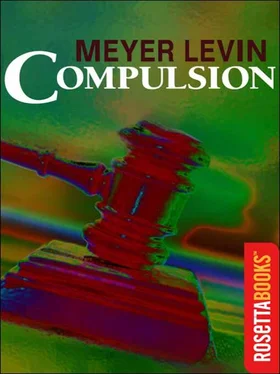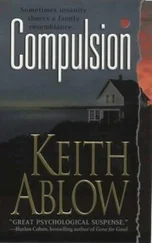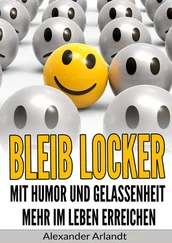“Do you want me to break my leg?” Judd said.
“I’ll risk mine first.” Padua reached out his hand for the spectacles, but then corrected himself, putting them aside, “Anybody got another pair? We might be needing these some day in court, who knows.”
The secretarial fellow, now introduced as Czewicki, also an assistant State’s Attorney, handed over his shell-rims. “Be careful. You want to leave me blind?”
“Don’t worry,” Horn said humourlessly. “The state will buy you another pair.”
Padua slipped Czewicki’s glasses into his pocket, walked back a few steps, then allowed himself, with a certain elegance, to trip over the phone books. Nothing happened. He offered the substitute glasses to Judd. “Want to try?”
Judd thought of protesting at this point. Still, this nonsense could turn in his favour. “I suppose I might stand on my head,” he joked. “That ought to do it.” Then he let himself trip over the books, pitching forward. At least, he wished that the bastard’s glasses would be smashed.
It became too stupid. Five, six times, he must have tried it. Horn was sitting there like a school teacher. Frowning, he rose and said, “I’ve got an idea. Would you mind taking off your coat?”
“Why, no,” said Judd, “I’m getting hot from all this exercise anyway.”
The State’s Attorney took Judd’s jacket and placed it on the floor. Then, as one absorbedly performing some abstract demonstration, he picked up the jacket by its bottom. The glasses slipped soundlessly from the pocket and lay on the carpet.
All looked at Horn as though he had performed a great feat.
“That’s how it might have happened, isn’t it?” said Horn, helpfully.
“Why, obviously,” said Judd, “glasses can fall out that way. But I don’t recall having my coat off that day.” Instantly he wanted to kick himself. He tried to backtrack. “But of course I might have.”
Padua was shaking his head, thoughtfully. “You wouldn’t pick up your coat that way.”
“Why?”
“You’re pretty careful about your clothes, Padua said. “I noticed it, because I’m the same way. But perhaps – in the dark-”
Judd stared back at the fellow, unblinkingly. Certainly, he told himself, he was superior in intelligence to this wop. He must simply be careful not to be tripped by his own over confidence. He must not try to prove them wrong on each remark, as he had done so far.
Receiving no reply, Padua resumed, “Another point confuses me. When you spoke to Captain Cleary last Saturday, the question of the glasses did come up.” So during the last hour, they must have been in touch with Cleary. They must now have the report he had written.
“Yes. I told him I used to wear glasses.”
“Then, surely when you got home you checked up?”
“No,” Judd said. And as they stared at him: “Perhaps that was when it crossed my mind, and I decided not to. As I said, I would have hated to see my family get involved over an unhappy coincidence of that kind.”
Padua took a long breath, and said, quietly, “As a matter of fact, you knew they were your glasses the whole time. You lied both to Captain Cleary and to us.”
“I resent that!” Judd snapped.
Horn looked toward Padua. There might have been a hint of disapproval in his expression.
With elaborate casualness, Padua said, “You’ve seen this ransom letter in the papers. What did you make of it?”
“Well, I didn’t study it very carefully.”
“Here.” Judd was handed the letter. He made himself read it over, word for word, so as not to seem familiar with it.
“Judd, what sort of man wrote that letter, do you think?”
“Well, obviously he is not uneducated. I would say at least a high-school graduate. There don’t appear to be any errors in grammar or spelling. Unless – the word kidnaped . It is spelled here with two p ’s.”
“Isn’t that correct?”
“I think it would be the British way,” he said. “I believe we would use one p . But either could be called correct.” How he had argued with Artie about it! But now, Judd felt that making this point separated him from the letter. He replaced the letter on the desk.
After a short silence, Horn said, rather formally, “Suppose you tell us where you were on the afternoon and evening of May 22.”
“May 22?” Now, this would be the last round. “Oh, the day of-”
“Yes.”
“Well, offhand, I suppose it was a day like any other day. I went to my classes…” Now he was approaching the barrier. The alibi. The week that he and Artie had agreed upon for using the alibi was technically over. Today was Thursday. “May 22 – that was a Wednesday, wasn’t it?”
“Yes. A week ago yesterday.”
“I don’t recall any special activity on Wednesday.”
“But surely, only one week ago – you’ve got a pretty good memory about almost tripping out there in Hegewisch a few days before that.”
“Well, I had my Harvard exam on Friday morning, so I was pretty busy studying.”
“Friday morning – you took an exam?”
“For Harvard Law,” he said modestly.
“How’d you make out? Was it tough?” asked Czewicki.
“Of course it was only an entrance exam, and I boned up pretty well.”
“A Phi Bete would have no trouble,” Padua said.
“That’s a great school,” Czewicki said. “You’ll probably come back here and beat the pants off us.”
Horn brought them back to the topic. “What time did you leave the university? On Wednesday.”
“About noon.”
And where had he lunched? At home?
“Well, I usually lunch with friends. Yes, Wednesday I believe I lunched at the Windermere with a few friends – Willie Weiss and Artie Straus.” They wrote down the names. For the first time, he had brought Artie into it. “I recall driving my aunt and uncle home, in the evening.”
“What time was that?”
“About ten. Perhaps a little after.”
“They had been visiting?”
“Yes. For dinner.” Let them assume he had been home for dinner.
“You were home for dinner?”
Too easily checked. “No. I was out. I came home to drive them.” Now he would have to use the alibi. He had to tell some kind of story. Why had he and Artie chosen to put a time limit on the alibi? They should have agreed to stick to it until he sailed. He tried desperately to think of some other plausible story, but his mind seemed frozen, blank. There was only this path.
“Were you out alone?”
“With a friend.”
“Girl friend?” Padua said.
“Well, yes, in a way.”
Respectfully: “Can you give us her name?”
Judd hesitated.
After all, Padua kidded, the girl’s honour was scarcely at stake, since he had come home by ten o’clock.
Perhaps he could still keep Artie out of it. He said he couldn’t tell the girl’s name because he didn’t really know her name. It was a pickup.
They exchanged looks again.
“I thought you were so busy studying,” said Horn.
“Well, you know how it is before an exam. You bone on the last day – at least I always do. I stay up all night before the exam, as I find that a sleepless night makes me extremely alert. So I did my intensive studying on Thursday.”
“And Wednesday you were out on the town.” Padua clucked his tongue.
Judd gave them the alibi, but without Artie. How he had gone birding most of the afternoon in Lincoln Park, then he hadn’t returned home for dinner because – well, his dad might then have expected him to stay in and study. So he had eaten in a restaurant and then he had picked up this girl on 63rd Street, and taken her to the wooded island in Jackson Park, and tried to make her, but she wouldn’t come across, so finally he had let her out to walk home. She had said her name was Edna.
Читать дальше












